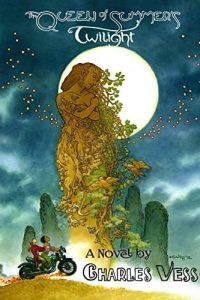Charles Payseur Reviews Short Fiction: Cast of Wonders, Escape Pod, and Strange Horizons
 Cast of Wonders 11/15/22, 12/11/22
Cast of Wonders 11/15/22, 12/11/22
Escape Pod 11/17/22, 12/8/22
Strange Horizons 11/14/22, 11/21/22, 11/28/22, 12/5/22
Cast of Wonders rounded out November with the feline-centric “The Cat of Lin Villa” by Megan Chee. The story features a cat who enjoys the company of a woman trapped in an unhappy and abusive marriage. Because she gives treats and company, this cannot stand, and it’s up to the cat to save Mrs. Lin – but enlisting the help of a fox spirit doesn’t exactly go as expected. Still, the story captures a folkloric feel, the cat crossing the border between mortal and spirit realms in a quest that is partly selfish, but mostly not. Chee weaves an entertaining story around a narrator who is sharp and cynical on the outside but a bit of an old softy where it counts. A must-read for cat lovers!
November brought a much heavier and more melancholy story to Escape Pod with Renan Bernardo’s “A Shoreline of Oil and Infinity”, which finds a lagoon once lush and ripe with life decimated and largely abandoned after an oil tanker crash. Vitória is one of the last remaining, with a small army of little bots and a determination to reclaim her home, to occupy something corrupted to make it good. But it’s been more difficult since her brother disappeared, and her faith is cracked and strained, her resilience waning. Bernardo captures Vitória’s hope and connection to the land vividly, with all the messy lines that bind her to the place, the past, and something that’s been fundamentally lost. It’s a beautiful story about work and hope, and finding new energy and life in unexpected places.
Strange Horizons never fails to deliver on the strangeness promised in their name, and November saw a number of works taking innovative approaches to the weird and wonderful. “B-ing” by Crystal Odelle imagines a drug that treats gender dysphoria through a kind of time travel, so that transgender people taking it fracture their own timeline – allowing them to live as if their bodies had always matched who they knew they were. Side effects, however, include aging backwards, and the narrator of the story finds the experience affirming but odd, free at last to explore their possibilities but uncertain what it means for their past and future selves. Structurally, Odelle manages a closed-circle plot where time travel isn’t at all how it’s typically portrayed. With care and beauty, the characters find their way boldly forward in this tender and heartfelt tale. Continuing the strangeness, “Ampersand” by Sara S. Messenger is a prose poem that finds a second-person You on a journey – caught in the magic and nostalgia of travel but plagued by a string of bad omens. Your identity is never fully known, but you might be a train and all its passengers, all those varied lives hiding secret pains and deep emotions that join together, as alluded to in the title. Rather than multiplying traumas and hurts, though, the pain is shared out, diluted through the collection of people brought together in you, their travels all part of a story where no singular chapter overpowers, but rather joins into a chorus of possibility and movement. Closing out November, Alexis Renata’s poem “TO THOSE WHO INHERIT THE EARTH” breathes with a sense of the natural world and a hope for (or perhaps a warning for) those who might come after humanity is long gone – when the planet has had a chance to heal from the harm we’ve done it. To these new sentient beings the narrator offers a lens with which to see the past, present, and future and a way to make sense of the artifacts that remain that tell a broken story of humans and our world. There’s a great sense of wonder and awe at the resilience and power of the world tempered by the scope of the impact humans have had and the fragility we have created in our environments. Finally, moving into December, Devin S. Turk’s poem “Statue of David with Top Surgery Scars” tackles transformational texts, in this case queering the image of the famous statue of David through the introduction of scars. This kind of recontextualization changes the impact of the piece, commenting on masculinity, bodies, and what beauty is and can be. At the same time, the poem recognizes that this new context, this transformation, comes without the permission or even notice of the original work, which remains impassive to the effort. The power of the image, though, and the challenge it represents, is not dulled or lessened by being apocryphal, however, and Turk’s lines shine with a keen insight and vivid language.
Recommended Stories
“A Shoreline of Oil and Infinity”, Renan Bernardo (Escape Pod 11/22)
“B-ing”, Crystal Odelle (Strange Horizons 11/22)
Charles Payseur is an avid reader, writer, and reviewer of speculative fiction. His works have appeared in The Best American Science Fiction and Fantasy, Lightspeed Magazine, and Beneath Ceaseless Skies, among others, and many are included in his debut collection, The Burning Day and Other Strange Stories (Lethe Press 2021). He is the series editor of We’re Here: The Best Queer Speculative Fiction (Neon Hemlock Press) and a multiple-time Hugo and Ignyte Award finalist for his work at Quick Sip Reviews. When not drunkenly discussing Goosebumps, X-Men comic books, and his cats on his Patreon (/quicksipreviews) and Twitter (@ClowderofTwo), he can probably found raising a beer with his husband, Matt, in their home in Eau Claire, Wisconsin.
This review and more like it in the February 2022 issue of Locus.
 While you are here, please take a moment to support Locus with a one-time or recurring donation. We rely on reader donations to keep the magazine and site going, and would like to keep the site paywall free, but WE NEED YOUR FINANCIAL SUPPORT to continue quality coverage of the science fiction and fantasy field.
While you are here, please take a moment to support Locus with a one-time or recurring donation. We rely on reader donations to keep the magazine and site going, and would like to keep the site paywall free, but WE NEED YOUR FINANCIAL SUPPORT to continue quality coverage of the science fiction and fantasy field.
©Locus Magazine. Copyrighted material may not be republished without permission of LSFF.







